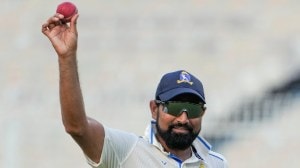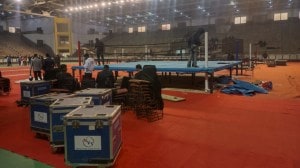Tariff Tracker, May 14: Deals announced in Trump Saudi visit, Syria sanctions to be repealed
The US President on Wednesday met with Syrian President Ahmed al-Sharaa, having promised to repeal longstanding American sanctions on the country. On Tuesday, the US and Saudi committed to $600bn in investments, according to the White House.
US President Donald Trump met with Syrian President Ahmed al-Sharaa on Wednesday, ahead of the GCC-USA Summit in Saudi Arabia on the second day of his Middle East visit.
The meeting with al-Sharaa reportedly finalised an agreement to repeal longstanding US sanctions on Syria, a move he had announced the previous day.
The GCC-USA Summit had the leaders or representatives of six Gulf countries in attendance: Qatar, Kuwait, Bahrain, Oman, the UAE and Saudi Arabia. The summit, according to a statement by the Saudi Press Agency, presents “an opportunity to discuss pressing political and security challenges and coordinate efforts to bolster regional security and stability.”
After this, the President will travel to Qatar to begin the second leg of his four-day tour.
Currently, the US tariffs on the Gulf Cooperation Council (GCC) nations amount to 10% of each country’s exports.
A royal welcome, deals galore
Trump arrived in Riyadh on Tuesday to a royal state welcome. The Presidential aircraft, Air Force One, was escorted by six Saudi F-15s in its final stretch. Upon landing, he was escorted from his aircraft to the Royal Court by Saudi Crown Prince Mohammed bin Salman (MBS) on a lavender carpet, while the presidential limousine was flanked by riders on Arabian horses, according to NYT reporting.
He addressed the Saudi-US Investment Forum, which was also attended by the CEOs of Amazon, Uber, BlackRock and SpaceX. The White House said it had secured $600 billion in investment commitments, which MBS promised to scale up to $1 trillion. However, the deals announced by the White House currently add up to about $300 billion, according to a NYT report, which separately cited the forum’s organisers as claiming 145 deals worth over $300 billion had been secured.
The most significant of these is the $142 billion arms deal, which, according to the White House, will provide Saudi Arabia with “state-of-the-art warfighting equipment and services from over a dozen U.S. defense firms.” This deal alone is nearly double the kingdom’s defence budget, which stood at around $78 billion this year, according to the Global Firepower Index.
Other agreements of note included a $20bn investment by Saudi company DataVolt in Artificial Intelligence (AI) data centres and infrastructure in the US and $2bn in US investments in Saudi infrastructure projects, according to the White House.
Bloomberg reported that chipmaker Nvidia promised to sell “several hundred thousand” of its latest ‘Blackwell’ chips to Humain, a Saudi startup to boose its AI efforts, according to this report. The same report also announced that Humain secured a $10bn collaboration with Advanced Micro Devices, Nvidia’s closest rival in AI accelerators.
Repealing crippling sanctions on Syria
On Tuesday, the US President announced that the US would lift its sanctions on Syria, months after a rebel alliance led by Ahmed al-Sharaa and his group, Hayat Tahrir al-Sham, ousted the presidential regime of Bashar al-Assad in December. His meeting with the interim Syrian President on Wednesday marked the first ever meeting of leaders of the US and Syria in 25 years, according to the NYT.
According to Trump, this would give Syria a “chance at greatness” and said “it’s their time to shine.” “We’re taking them all off,” he said. “Good luck Syria, show us something very special.”
While the specific details of the announcement are currently unknown, the prospect of withdrawn sanctions presents a vital lifeline for the Arab nation. The sanctions, meant to choke the Assad regime, blocked foreign financing, especially foreign aid, from reaching Syria.
The US had in place a multi-layered system of economic sanctions on Syria that brought it perilously close to economic shutdown. Syria is one of the most sanctioned countries in the world, having first been designated as a State Sponsor of Terrorism in 1979 by the US. The majority of these were introduced in the wake of a civil war that began in 2011. However, the passage of the Caesar Act by the Trump Administration in 2019 targeted persons affiliated with the Assad regime, the financial sector, and all affiliated third parties. This was further renewed by former President Joe Biden last year.
A 2024 report by the United Nations concluded that the sanctions made it difficult for vital sectors like health, education, agriculture and water to access necessary funding and equipment. Sanctions on the Syrian energy sector had led to frequent fuel shortages, which in turn snowballed economywide, according to a report by Syria Direct.
According to a Reuters report, the Syrian economy more than halved between 2010 and 2021, in official data cited by the World Bank in spring 2024. However, the Bank’s estimates indicated a sharper 84% contraction between 2010 and 2023. Syria was categorised as a low-income country by the World Bank in 2018, with a GDP of $23.63 billion in 2022. According to UN reports, over 90% of its 23 million population lives below the poverty line.
- 01
- 02
- 03
- 04
- 05





































